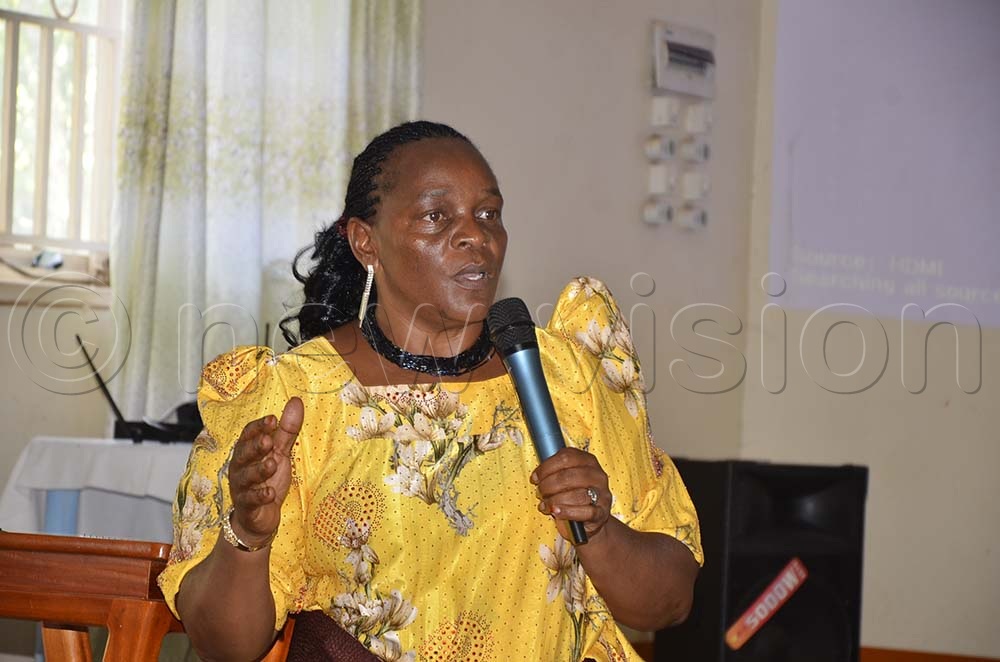'Over-commercialisation of politics locking women out of leadership in Bunyoro'
Margaret Barungi Nyakabiito, a female leader and manager at Bunyoro Broadcasting Services, said the high cost of politics has discouraged many women from seeking leadership positions.
Minister Mutuuzo with Bunyoro women leaders. (Credit: Yosam Gucwaki)
The over-commercialisation of politics has been identified as a major barrier to women’s participation in the electoral process in the Bunyoro sub-region.
This concern was raised by women leaders during a dialogue on electoral violence and its impact on women’s political participation, organised by the Ministry of Gender, Labour, and Social Development at the Country Inn Hotel in Masindi town on Wednesday (September 17).
Margaret Barungi Nyakabiito, a female leader and manager at Bunyoro Broadcasting Services, said the high cost of politics has discouraged many women from seeking leadership positions.
“Many people lack the financial resources to support themselves in politics. If the excessive spending is not curtailed, we risk having few women in leadership positions,” Barungi said.
She also cited challenges such as an inferiority complex, domestic violence, disrespect, and sexual harassment, which further discourage women from engaging in politics.
Olive Tindyebwa, a female leader from Kabango Town Council, observed that individuals in privileged positions, including Members of Parliament and LCV chairpersons, often side with politicians of their choice and invest heavily, fuelling electoral violence.
The women leaders also criticised security operatives, RDCs, and police for favouring financially stronger candidates, saying this worsens electoral violence and disproportionately affects women with fewer resources.
They called for a ban on alcohol consumption at polling stations, citing the chaos caused during the recent NRM primaries in some villages.
Zaina Byenkya, a councillor at Masindi Municipality, encouraged women to believe in themselves and report incidents of violence during elections to ensure there is a record.
Sarah Gonzaga, chairperson of the women’s council in Masindi district, praised the cooperation and unity of women leaders in advancing women’s interests. She advised them to seek knowledge, not fear asking questions, and balance political ambitions with family responsibilities.
Minister Peace Mutuuzo (Credit: Yosam Gucwaki)
She further urged women to agree with their husbands on political engagements and to practise responsible parenting.
The participants also suggested holding voting on the same day to avoid escalating conflicts, while Silvia Karungi, secretary for social services in Masindi district, argued that the prolonged period between primaries and final elections is unsustainable for many women.
Emily Akullo, programme manager at the National Women’s Council, explained that the dialogue was aimed at sharing the challenges faced by women in elections, as well as success stories, to inspire more women to participate.
Masindi Woman MP, Florence Asiimwe, urged women to stick to their manifestos and avoid “politics of blackmail.” She praised President Museveni for creating an enabling environment for women to excel in leadership.
Gastavas Kakaire, district returning officer for Masindi, lamented the low uptake of directly elected councillor positions at district and municipal levels, attributing it to financial demands.
“Many women almost failed to get nominated because of money. People were asking for money to endorse them,” Kakaire said.
In her closing remarks, Peace Mutuuzo the gender and culture state minister, said religion and culture remain major factors behind the disrespect of women.
“We are here to build your confidence to participate in the upcoming elections. Offer yourselves for different leadership roles. Be assertive and consistent,” Mutuuzo said.
She also condemned voting by lining up, describing it as undemocratic, and revealed she had written to the President requesting its removal.